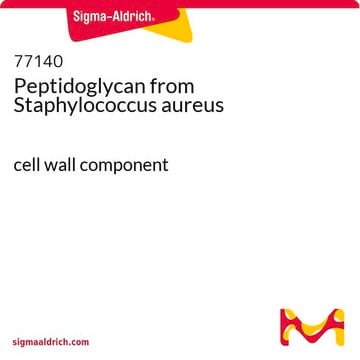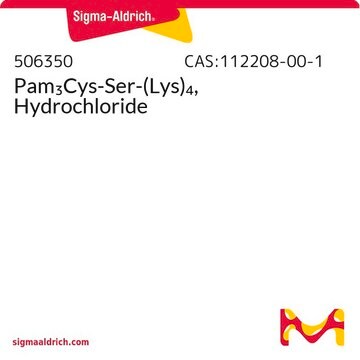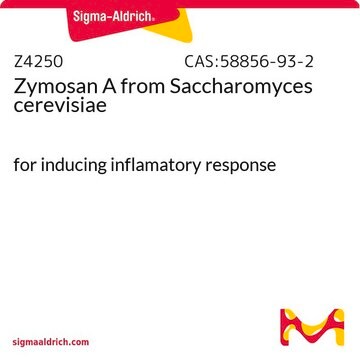Recommended Products
biological source
Bacillus subtilis
Quality Level
form
lyophilized powder
lipid type
polymerizable lipids
shipped in
ambient
storage temp.
2-8°C
Biochem/physiol Actions
Lipoteichoic acid (LTA) is a complex component of cell walls of Gram-positive bacteria that are involved in a wide range of cell processes such as the stimulation of immune responses and cell signaling pathways. LTA differs between species of gram-positive bacteria. Lipoteichoic acid from Bacillus subtilis may be used to compare its structure, immunogenicity and functions versus other bacterial LTAs.
Lipoteichoic acid (LTA) is a teichoic acid attached to a lipid abundant on Gram-positive bacteria cell wall. LTA is a pathogen-associated molecular-patterns (PAMP) recognized by Toll-like receptor 2 (TLR2), This recognition leads to the activation of NF-kB.
Storage Class
11 - Combustible Solids
wgk_germany
WGK 3
flash_point_f
Not applicable
flash_point_c
Not applicable
ppe
Eyeshields, Gloves, type N95 (US)
Certificates of Analysis (COA)
Search for Certificates of Analysis (COA) by entering the products Lot/Batch Number. Lot and Batch Numbers can be found on a product’s label following the words ‘Lot’ or ‘Batch’.
Already Own This Product?
Find documentation for the products that you have recently purchased in the Document Library.
Customers Also Viewed
Mardi A Crane-Godreau et al.
Infection and immunity, 73(1), 476-484 (2004-12-25)
Having previously shown that CCL20/macrophage inflammatory protein 3alpha and tumor necrosis factor alpha (TNF-alpha) are released by polarized primary rat uterine epithelial cells (UEC) in response to Escherichia coli but not to Lactobacillus rhamnosus, we sought to determine if epithelial
Xiang-Jun Rao et al.
Developmental and comparative immunology, 34(10), 1119-1128 (2010-07-06)
Activation of prophenoloxidase and synthesis of antimicrobial peptides (AMPs) are two important innate immune mechanisms in insects. In the current study, we investigated immune responses activated by three major bacterial components, lipopolysaccharide (LPS) (including rough mutants of LPS), lipoteichoic acid
Siegfried Morath et al.
Journal of endotoxin research, 11(6), 348-356 (2005-11-24)
The role of lipoteichoic acids (LTAs) from Gram-positive bacteria as immunostimulatory molecules was controversial for many years, as inadequate preparation methods as well as heterogeneous and endotoxin-contaminated commercial preparations led to conflicting results. An improved purification methodology for LTA now
Bing Yang et al.
PloS one, 8(5), e64106-e64106 (2013-05-30)
Insect prophenoloxidase (PPO) is essential for physiological functions such as melanization of invading pathogens, wound healing and cuticle sclerotization. The insect PPO activation pathway is well understood. However, it is not very clear how PPO is released from hemocytes and
Young Hee Ryu et al.
International immunopharmacology, 9(1), 127-133 (2008-11-18)
Lipoteichoic acid (LTA) is a major immunostimulating component in the cell wall of Gram-positive bacteria as lipopolysaccharide of Gram-negative bacteria. However, LTA is expressed on not only pathogenic but also nonpathogenic Gram-positive bacteria. In order to examine whether the immunostimulating
Our team of scientists has experience in all areas of research including Life Science, Material Science, Chemical Synthesis, Chromatography, Analytical and many others.
Contact Technical Service









